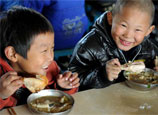
We can see from this regulation that the guardianship responsibility of the government is the final option. However, due to the lack of a specific system, the government is in an embarrassing position: It has no initiative to exert its right to take care of the children, but when problems occur, it is the first to blame.
Nonetheless, the establishment of a formal system needs policy support. Many migrant workers would like to take their kids with them, but education, medical treatment and housing problems are the barriers for them to stay in cities far from their hometowns. Even if the children do stay with their parents, the external environment often does them no good for their development.
Meanwhile, governments in areas where a large number of people have migrated away to work should improve the living and education environments of children that are left behind and set up special organizations to take care of them. This is to ease the worry of parents as well as to ensure the children grow up healthily.
Children are the future of our country. The number of those left behind in rural areas is becoming more. The family unit plays a key role in ensuring a safe upbringing for children.
Since the tragedy in Bijie took place, governments in other places have carried out measures to protect left-behind children. It is sincerely hoped that they will continue to do so.

















![]()
